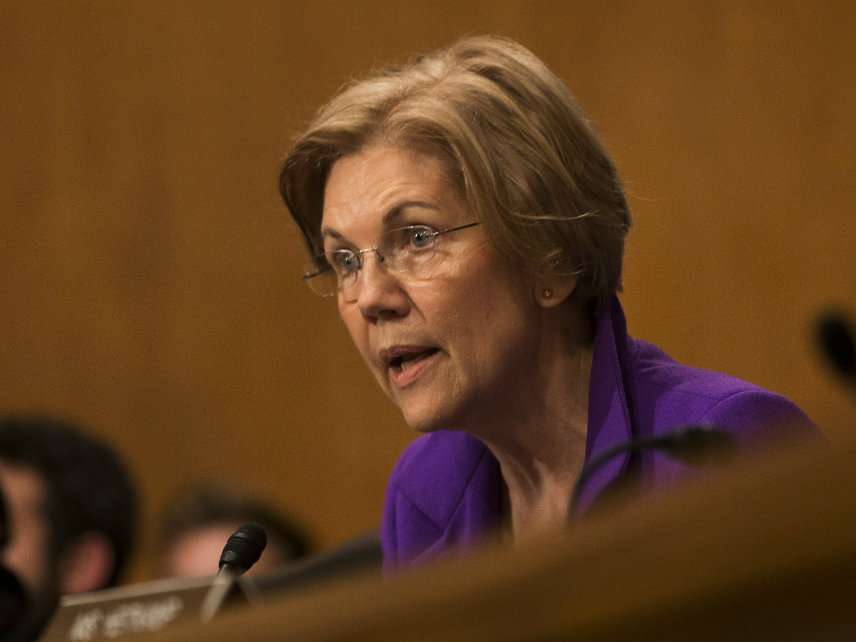Consumer Financial Protection Bureau
The Consumer Financial Protection Bureau Now Has Two Different Acting Directors
The legal squabble is really a proxy battle over whether the agency will be subject to meaningful political oversight.

For a preview of what policy battles will increasingly look like as they are separated from the legislative arena, consider the current leadership showdown at the Consumer Financial Protection Bureau (CFPB).
As of this morning, two different people are claiming to be the agency's acting director.
The first, Leandra English, was appointed deputy by director Richard Cordray, who stepped down last week. Under the Dodd-Frank legislation that created the financial regulator, the director has the authority to appoint a deputy. The legislation says that the deputy shall serve as acting director if the director is absent or unavailable, a condition that might seem to describe Cordray.
But Dodd-Frank isn't the only potentially relevant legislation. The Federal Vacancies Reform Act of 1998 allows the president to appoint an individual who has previously been confirmed by the Senate as acting director when a leadership vacancy at a federal agency. With Cordray out, a vacancy clearly exists, and President Trump announced weeks ago that he would tap Mick Mulvaney, already serving as White House Office of Management and Budget director, to fill the post. Mulvaney showed up to work at the CFPB this morning, stepping into the director's office. He brought donuts.
English, in turn, has already sent out Thanksgiving greetings to CFPB staff, signing the email "Acting Director." More importantly, she has filed suit against Trump and Mulvaney, arguing that she is the agency's rightful director. Sen. Elizabeth Warren, who was instrumental in the creation of the agency, is backing English's claim. (She has reportedly not attended senior staff meetings, however.)
There is legitimate tension between the two claims, but on the merits, Trump and Mulvaney appear to have the better argument, for reasons that Hoover Institution Research Fellow Adam White lays out in a post at Yale Law's Notice & Comment. To assume that Dodd-Frank gives an outgoing director the ability to name an acting successor essentially requires one to assume that it effectively renders the Vacancies Act null. Typically, courts attempt to read statutes in a way that allows them to coexist rather than to clash. In this case, that means that Trump and Mulvaney have the stronger case.
Indeed, the CFPB's own general counsel, Mary McLeod, agrees that Trump has the authority to fill the position. "I advise all bureau personnel to act consistently with the understanding that Director Mulvaney is the acting director of the CFPB," McLeod wrote in a memo to staff. McLeod was hired under Cordray.
In a larger sense, however, the fight over the legal particulars is a proxy battle over the future of the financial regulator, and whether it will be allowed to operate independent of democratic oversight.
Sen. Warren, the agency's architect and chief advocate, all but says as much in an interview with The Washington Post. Mulvaney, like most congressional Republicans, has been critical of the agency, and if he and Trump are allowed to prevail, she says, "The agency will be headed by someone who fundamentally doesn't believe in its mission."
Well, yes. That is more or less the point. And it is the inevitable risk of setting up a highly politicized regulatory agency that is designed in large part to act in ways that are unchecked by political or legislative review. The agency's single-director structure was ruled unconstitutional by a federal court last year in an opinion declaring the position to be "unchecked" and "unaccountable." A former aide to Barney Frank — the Frank of Dodd-Frank — recently wrote that its novel funding mechanism (it is funded via the Federal Reserve) was specifically designed to avoid congressional oversight. CFPB was built to be untouchable. Cordray himself was initially appointed by President Obama during a Senate recess that was not actually a recess. The Supreme Court ruled that the appointment was unconstitutional.
In theory, its structure is intended to insulate the agency from political influence, and that its considerable powers are necessary to perform its duties. Instead, its design merely guarantees that the battle for control moves to other forums, like the courts. Divorcing policy battles from Congress and the legislative process does not mean that those battles are not fought. They just change venues.
The fight over the director, then, is just a version of the fights that have been waged over CFPB from the beginning: How much power should it have? And what sort of external checks should its power be subject to, if any?
What Warren and the agency's other backers really seem to want is for the CFPB to be able to operate in a highly politicized manner without any meaningful political checks on its behavior. It is a blatant attempt to exercise power without accountability.
As Jonathan Adler notes at The Volokh Conspiracy, the courts may not resolve this particular fight if the Senate confirms a new Trump appointed director. But regardless of how this particular bit of bureaucratic drama plays out, the fundamental questions it raises about the agency and the scope of its independence and authority are likely to persist.


Show Comments (131)